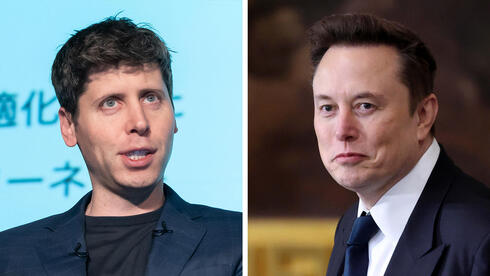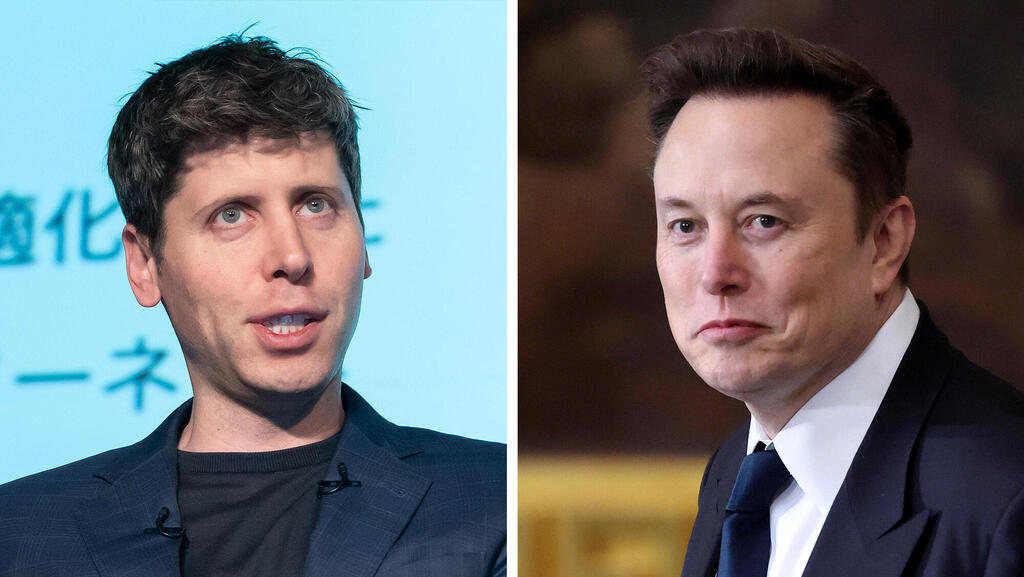
Analysis
Musk vs. Altman: A clash of ideals, or a contest to control the future of AI?
With personal ambitions and massive sums in play, it’s unclear whether the future of AI or the tycoons' egos are at stake.
A group of investors led by Elon Musk submitted an offer this week to acquire OpenAI for $97.4 billion. The company's CEO, Sam Altman, publicly rejected the offer—specifically on the social network owned by Musk—and responded with a biting remark: "no thank you but we will buy twitter for $9.74 billion if you want." The response sparked outrage from Musk, who called Altman a "swindler" and later tweeted to his 215 million followers: "Scam Altman." He even announced, through his lawyer, that he and his group of investors were willing to match any higher offer made to acquire OpenAI—a move that underscores his strategic approach: using vast capital as a tool to gain control.
The clash between two major players in the world of artificial intelligence goes far beyond Twitter banter. It reflects the inherent tensions in an industry where power, money, and ideology mix into a ruthless struggle for control. Ostensibly, it is a battle of principle—how artificial intelligence should be developed and who can ensure responsible use of the most powerful technology ever created. In reality, it is a contest between two giants waving billions of dollars to prove their superiority, just before each explains to the public why he, and no one else, is the right person to lead humanity into an uncertain future.
The roots of the conflict between Musk and Altman date back to 2018, when Altman led a structural change at OpenAI, where Musk was an early investor. The shift from a non-profit model to a hybrid model allowed the company to raise more capital and expand its operations but also marked a breaking point between the two. Musk claims to this day that he left the company because of this change, while Altman asserts that Musk tried to take control and failed. Both sides are backed by facts: Altman did bring in Microsoft as a dominant investor and altered the business model, while historical correspondence proves that Musk sought complete control of OpenAI. As a result, rival camps have emerged—not only of supporters but also of conflicting worldviews regarding the future of artificial intelligence.
Each of these giants claims to be the only one capable of ensuring the responsible development of artificial general intelligence, a system predicted to match and even surpass human capabilities. OpenAI was founded to lead this development in a controlled manner, but Musk argues it has strayed from that path, prompting him to found the competitor xAI. The key question is whether this battle stems from a sincere concern for the future of humanity, or simply from unbridled competition for control of a promising industry.
At this point, the battle between Musk and Altman goes far beyond OpenAI. Musk, without holding any official public office, wields enormous power in the American political arena: he and a small team of advisers operate under the Department of Government Efficiency (DOGE), which aims to reduce the federal government budget. The office influences decisions concerning the departments of Labor, Education, and Energy, as well as the Medicare and Medicaid health insurance programs, which almost 150 million Americans rely on. Through DOGE, Musk is promoting mass layoffs, cuts in research grants and aid programs, and even attempting to overhaul the US Treasury's payment system—all ostensibly from a purely business perspective.
Meanwhile, Altman is not only working to raise capital for OpenAI at a valuation of $300 billion, but is also promoting the Stargate Project—an initiative to create unprecedented computational infrastructure, with a proposed $500 billion investment to build a state-of-the-art data center. Musk has publicly expressed doubts about Altman’s ability to finance the project, while continuing to emphasize the importance of extensive capital as a lever for achieving market control. While Musk is brokering deals behind the scenes to maximize his political power, Altman is advancing a move that could solidify his control over the future of computing.
Amid all this, Musk’s bid for OpenAI seems more like an ego battle than a calculated strategic move. Musk is raising $100 billion—a sum unfathomable to most people—to regain control of the company he was ousted from eight years ago. But instead of sparking a debate about the absurdity of this move, Altman responds in kind, waving $10 billion—not as a statement of power, but as a joke about the value of Twitter, now X. Witty? Maybe. But the joke is on us.
Musk and Altman are not just two rival entrepreneurs; they have become symbols of a much broader struggle over control of the future of artificial intelligence—a field they claim will reshape the world’s economy, society, and political power. Both boast good intentions, but the real question is whether this is truly a discussion about “responsible development” or a desire to dominate. Amid personal ambitions and billions of dollars changing hands, one question remains open: Is this battle being fought for the public good, or only for the benefit of the tycoons?














